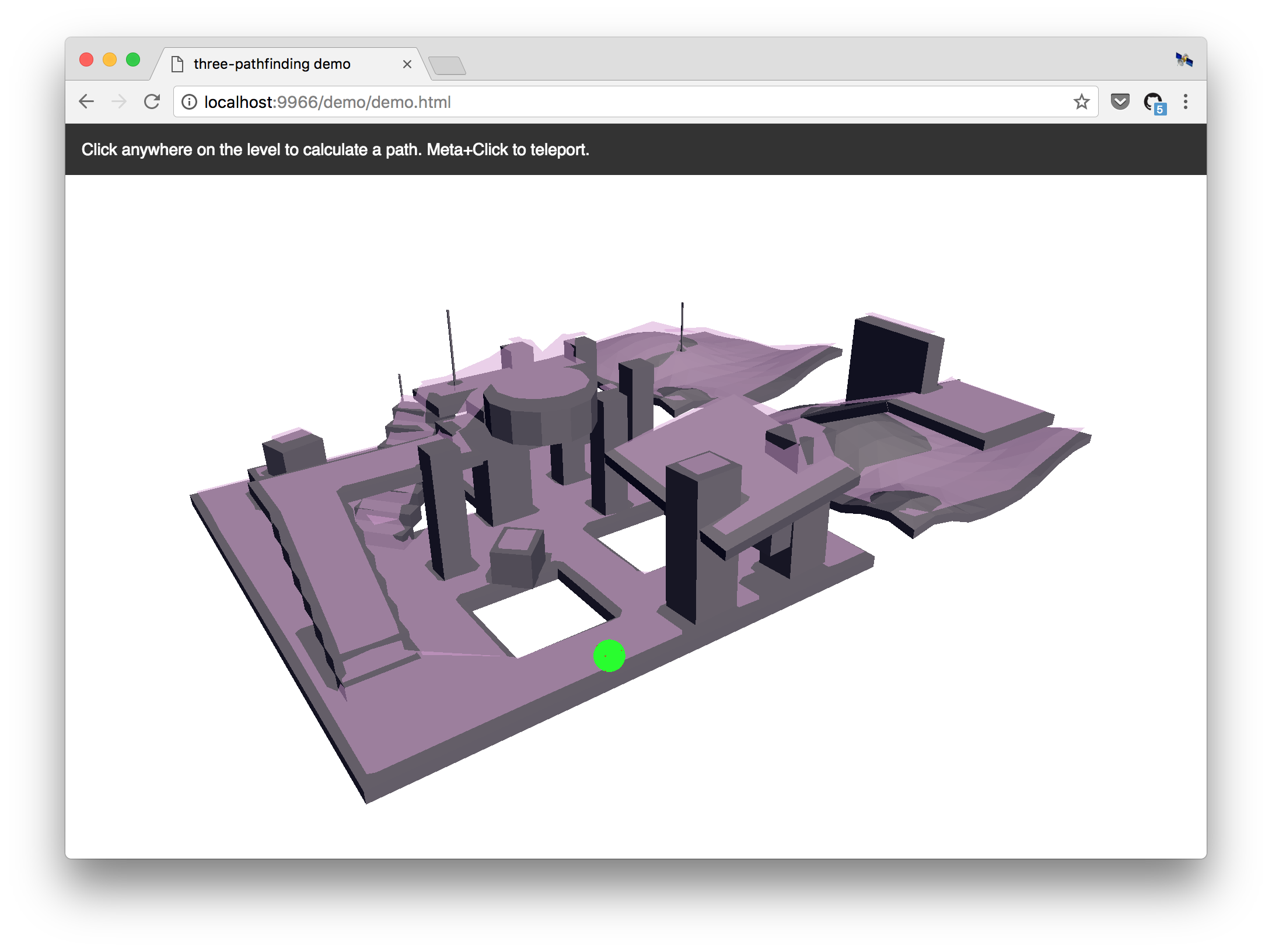Navigation mesh toolkit for ThreeJS, based on PatrolJS. Computes paths between points on a 3D nav mesh, supports multiple zones, and clamps movement vectors for FPS controls. To learn how to create a navigation mesh using Blender, see Creating a Nav Mesh.
Thanks to Nick Janssen for creating PatrolJS, which was the basis for this library.
Traditionally games and 3D apps used waypoints to help their AI agents navigate. This is bad and has a lot of problems, but is generally easier to implement than navigation meshes. Navmeshes are far more accurate, faster, and take into account the size of the AI agent (e.g. tanks require move space to maneuver than soldiers).
For a thorough introduction to Navigation mesh pathfinding, see AI Blog's article, Fixing Pathfinding Once and For All.
npm install --save three-pathfinding
This library does not build navigation meshes for you — instead, create a navigation mesh using Blender, Recast (CLI), or another tool.
Currently, this library does not accept the custom navigation mesh file formats created by tools like Recast. Instead, you will need to export the navigation mesh to a 3D model format (like OBJ or glTF) and then load it with one of the three.js loaders, like THREE.OBJLoader or THREE.GLTFLoader. The library accepts a THREE.BufferGeometry instance, and follows the +Y=Up convention of three.js and glTF.
Loading a mesh from a .gltf file:
// For ES6, see: https://github.com/mrdoob/three.js/issues/9562
// CommonJS
const THREE = window.THREE = require('three');
require('three/examples/js/loaders/GLTFLoader.js');
let navmesh;
const loader = new THREE.GLTFLoader();
loader.load( 'navmesh.gltf', ({scene}) => {
scene.traverse((node) => {
if (node.isMesh) navmesh = node;
});
}, undefined, (e) => {
console.error(e);
});Initializing the library, creating a level, and finding a path:
// ES6
import { Pathfinding } from 'three-pathfinding';
// CommonJS
const { Pathfinding } = require('three-pathfinding');
// UMD
const Pathfinding = window.threePathfinding.Pathfinding;
// Create level.
const pathfinding = new Pathfinding();
const ZONE = 'level1';
pathfinding.setZoneData(ZONE, Pathfinding.createZone(navmesh.geometry));
// Find path from A to B.
const groupID = pathfinding.getGroup(ZONE, a);
const path = pathfinding.findPath(a, b, ZONE, groupID);The origin of an agent should initially be placed on the surface of the nav mesh. If needed, a dummy object can be used for pathfinding logic, and the rendered model for that agent may be placed at on offset as needed.
git clone https://github.com/donmccurdy/three-pathfinding.git
cd three-pathfinding
npm install
npm run dev
The demo will start at http://localhost:3000/.
Defines an instance of the pathfinding module, with one or more zones.
Sets data for the given zone.
Returns a random node within a given range of a given position.
Returns Node
Returns the closest node to the target position.
Returns Node
Returns a path between given start and end points. If a complete path cannot be found, will return the nearest endpoint available.
startPositionVector3 Start position.targetPositionVector3 Destination.zoneIDstring ID of current zone.groupIDnumber Current group ID.
Returns Array<Vector3> Array of points defining the path.
Returns closest node group ID for given position.
zoneIDstringpositionVector3
Returns number
Clamps a step along the navmesh, given start and desired endpoint. May be used to constrain first-person / WASD controls.
startVector3endVector3 Desired endpoint.nodeNodezoneIDstringgroupIDnumberendTargetVector3 Updated endpoint.
Returns Node Updated node.
(Static) Builds a zone/node set from navigation mesh geometry.
geometryBufferGeometrytolerancenumber Vertex welding tolerance. (optional, default1e-4)
Returns Zone
Extends Object3D
Helper for debugging pathfinding behavior.
pathArray<Vector3>
Returns this
positionVector3
Returns this
positionVector3
Returns this
positionVector3
Returns this
positionVector3
Returns this
Hides all markers.
Returns this
Defines a zone of interconnected groups on a navigation mesh.
Type: Object
Defines a group within a navigation mesh.
Type: Object
Defines a node (or polygon) within a group.
Type: Object



